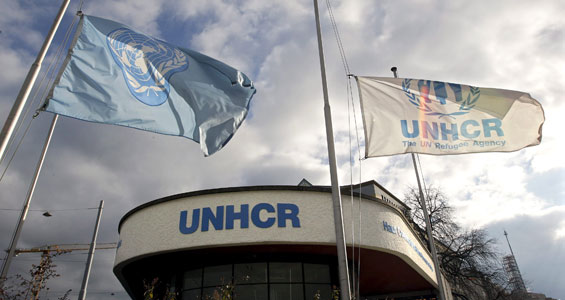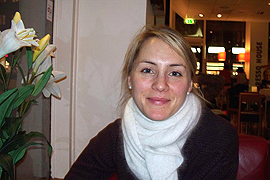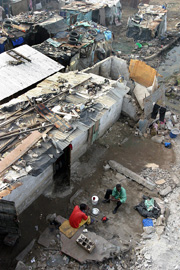The UN targets 2015 success
Increased effort required to meet the UN’s Millenium Development Goals, expert says.

 |
| Human rights are central to the implementation of the Millennium Development goals [EPA] |
Sweden, a relatively prosperous member of the European Union, has always pursued ambitious humanitarian and conflict resolution initiatives around the world.
As a nation that effectively remained neutral during both world wars, and which is committed to a doctrine of non-participation in military alliances, the Nordic country has prided itself on its large role within the UN.
Keep reading
list of 4 itemsWhy Egypt backed South Africa’s genocide case against Israel in the ICJ
US sanctions two RSF commanders as fighting escalates in Sudan’s Darfur
The Lost Souls of Syria – Part 1
Since Anna Lindh, the slain prime minister, began to strengthen the EU’s role within the UN, Sweden has embarked on several programmes to encourage cross-cultural exchange as well as to create an atmosphere for NGOs to actively engage in global assistance works.
Al Jazeera recently met with Louise Croneborg, the project manager of the Millennium Development Goals at the United Nations Association of Sweden.
Al Jazeera: What are the Millennium Development Goals (MDGs)?
Croneborg: The eight MDGs are our world leaders’ commitment to achieve global poverty reduction by the year 2015.
They comprise the push to eradicate extreme poverty and hunger, achieve universal primary education, promote gender equality and empowerment of women, reduce child mortality, improve maternal health, combat HIV/Aids, malaria and other diseases, ensure environmental sustainability and develop a global partnership for development.
These commitments were made at the UN’s Millennium Summit in September 2000. The UN’s member states and heads of governments were present and they agreed to an historical text – the Millennium Declaration.
The eight Millennium Development Goals are listed in this declaration and they were borne out of the summit.
Today, they have developed into the most ambitious comprehensive and concrete plan to release millions of people around the world from the atrocities of poverty.
The goals are measurable and achievable if the required political and financial priority is given to them.
The MDGs represent the opportunity to give millions of people greater freedom from the inhumane conditions of poverty – ensuring their basic human rights of a life free from disease, hunger, inability to read and write and unfair pay among others.
Implementing the MDG agenda requires action from national to local governments, religious institutions, civil society, the multilateral agencies and you and me.
The UN holds a key role in implementing focused strategies to achieve the goals, maintain vivid campaigns to advocate political and financial support for the MDGs, and scrutinise the successes and failures through detailed statistical reporting.
However, the MDG agenda involves us all and it is vital that people around the world are aware of the commitment their leaders have made in order for us to demand that they prioritise the plight of those who suffer the most.
This is highly important in all countries in the world, in developing and in richer ones.
There have been recent reports that after passing the half-way time period (2007) many of the goals are far from being met. What is the progress report on the MDGs being achieved?
 |
| Croneborg says the Universal Declaration of Human Rights is more topical than ever |
The MDGs were set to be achieved globally. However, great responsibility lies with national governments and thus, the goals are often measured nationally.
That is why we see tremendous differences between countries and we are often misguided by comparing individual countries.
Instead, each context, each challenge needs its own strategies to achieve the goals.
For example, Botswana has increased the enrolment of children in primary schools much faster than many other developing countries but may not meet the goal of 100 per cent enrolment by 2015.
Vietnam has experienced very rapid economic growth over the past ten years and can invest in schooling in other ways, such as invest greater resources into secondary and tertiary schooling. Vietnam has also increased enrolment in primary schools, but were not that far off 100 per cent as Botswana was to begin with and may thus meet the goal by 2015 (MDG 2).
Is it fair to compare the two countries and deem one better than the other when both have made efforts in prioritising primary schooling – albeit the fact that much more is needed?
What have the successes been so far?
On a global level there are several successes, but also many challenges where greater effort is needed.
For example, we are within global reach of the overarching goal of reducing extreme poverty (proportion living on less than $1.25 per day) by half.
Primary school enrolment is at least 90 per cent in all but two regions of the world.
The gender parity index in primary education is 95 per cent or higher in six of the 10 regions, including the most populous ones.
As for eradicating disease, the number of deaths from measles fell from over 750,000 in 2000 to less than 250,000 in 2006, and about 80 per cent of children in developing countries now receive a measles vaccine.
The number of Aids and Aids-related deaths fell from 2.2 million in 2005 to 2.0 million in 2007, and the number of people newly infected declined from 3.0 million in 2001 to 2.7 million in 2007.
The campaign for malaria prevention is also expanding, with widespread increases in insecticide-treated net use among children under five in sub-Saharan Africa, in 16 out of 20 countries, use has at least tripled since around 2000.
The incidence of tuberculosis is expected to be halted and begin to decline before the target date of 2015.
Also, some 1.6 billion people have gained access to safe drinking water since 1990.
Which of the goals may not be met?
 |
| Poverty remains a growing challenge in Africa [EPA] |
Poverty is one of the goals and targets which are likely to be missed unless additional, strengthened or corrective action is taken urgently.
The proportion of people in sub-Saharan Africa living on less than $1 per day is unlikely to be reduced by the target of one-half.
About one quarter of all children in developing countries are considered to be underweight and are at risk of having a future blighted by the long-term effects of undernourishment.
Of the 113 countries that failed to achieve gender parity in both primary and secondary school enrolment by the target date of 2005, only 18 are likely to achieve the goal by 2015.
Almost two thirds of employed women in the developing world are in vulnerable jobs as own-account or unpaid family workers.
In one third of developing countries, women account for less than 10 per cent of parliamentarians.
More than 500,000 prospective mothers in developing countries die annually in childbirth or of complications from pregnancy.
Some 2.5 billion people, almost half the developing world’s population, live without improved sanitation.
More than one third of the growing urban population in developing countries live in slum conditions.
Carbon dioxide emissions have continued to increase, despite the international timetable for addressing the problem.
Developed countries’ foreign aid expenditures declined for the second consecutive year in 2007 and risk falling short of the commitments made in 2005.
International trade negotiations are years behind schedule and any outcome seems likely to fall far short of the initial high hopes for a development-oriented [approach].
In a world of war, sectarian violence, rape, media repression and bloggers being jailed, where does the UN fit?
The UN is present, every day, all over the world.
Long after [the] media’s focus and interest has shifted to the next catastrophe, the UN stays in different locations of humanitarian crisis and assists civilians in need of basic support: with food, water, shelter, blankets, medicines and so forth.
Today, the UN assists over thirty million refugees around the world.
With regards to the sensitive issues of internal, domestic conflicts, the UN has endorsed the principle ‘Responsibility to Protect’ (sometimes shortened to R2P). The principle enjoins the world to intervene when political leaders cannot or will not guarantee the security of their population.
The UN Association of Sweden is a strong advocate for urgently turning the principle into practise, so as to prevent further human suffering and insecurity in the domestic conflicts around the world.
Has the UN lost its support, legitimacy and credibility among youths globally?
From our organisation’s perspective, we can primarily speak of the support among youths in Sweden.
We are an NGO who work with UN issues, including awareness raising and advocacy for a stronger and more efficient UN.
We work very closely with young people in Sweden to inform them of what the UN does and support them in their interest in international relations.
Youths in Sweden are very aware of global issues, ranging from poverty, security, environmental destruction and so forth.
This interest is coupled with a willingness to act and to get involved in dealing with finding solutions to the global problems.
Youths travel extensively and many widen their perspectives by studying abroad and managing languages other than Swedish.
The support for the UN among youths however, that we find, is relatively strong for one main reason: the UN is our only international organisation where 192 countries in the world can collaborate on the global challenges we face.
This does not mean that the support among youths is indiscriminate, but rather that there is a solid interest in the potential of the organisation.
However, the UN has many strengths and weaknesses. One challenge that is debated widely is the inability of the UN to stop humanitarian suffering in countries such as Darfur.
Moreover, the support for the UN and its credibility among youths is influenced by how media portrays the UN.
The traditional image of the UN-soldier has been changed to a much more humanitarian image over the past 25 years.
However, as scandals within the UN are made public, the debate of the UN’s credibility increases among youths.
We are seeing human rights violations everywhere, has the declaration of human rights fallen by the wayside?
No, the Declaration of Human Rights is more topical than ever – and not only because it is 60 years ago since it was adopted.
During the past few years, there has been an expansion of Human Rights Conventions: the Convention on the Rights of Person with Disabilities and the Convention against Enforced Disappearances.
Since 2006, the UN has a new council for human rights. The Human Rights Council is at present establishing its working order and which way it can most effectively fulfil its duty in review and scrutinise how the human rights conventions are realised and complied with.